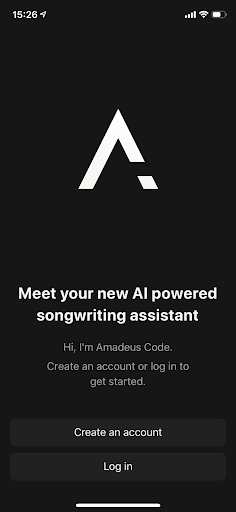Source: Author’s iPhone
“Alexa, compose me a song.”
Japanese startup Amadeus Code, an “artificial intelligence-powered songwriting assistant,” is the latest app that is riding the wave of A.I. art-generation. The algorithm scans a diverse database of popular music from the past five centuries (in theory - the earliest song this reviewer discovered was Schubert’s “Ave Maria” from 1825) and allows the user to specify the note range and length, drama, familiarity, and era. The app then creates a unique instrumental harmony based on these specifications, drawing inspiration from songs that have similar characteristics.
Source: Author’s iPhone
Source: Author’s iPhone
Each song is analyzed against nine different categories: Electronic, Party, Aggressive, Acoustic, Happy, Sad, Relaxed, Tempo, and Key. For example, the algorithm correctly identified that Coldplay’s “Viva La Vida” is in the A-flat major key and has a tempo of 138 beats per minute. It ranked the song high in the Acoustic, Sad, and Relaxed categories, and low in the Party and Aggressive categories. Users can select any of the categories to discover songs that have similar attributes; for example, when selecting Acoustic for “Viva La Vida,” the algorithm suggests a selection of songs by Sting, Adele, and Bruno Mars. Users can save these songs for later, see their characteristics, listen to them on Spotify, or select them as the new inspiration for the music generation algorithm.
Source: Author’s iPhone
Source: Author’s iPhone
When it comes to the actual music generation feature, users can toggle between different options under Melody and Chords. For Melody, there are three available sounds: alto sax, voice oohs, and saw wave. Under chords, the options are electric piano, shamisen, marimba, bass lead, and steel drums. By trying out different combinations, slightly different results can be achieved. If the music is not to the user’s liking at all, it can be discarded and replaced with a new suggestion by swiping up - the A.I. is capable of generating an infinite number of possible harmonies based on the same specifications.
There is definitely a learning curve to Amadeus Code, as there are a number of different features to explore. When users open the app for the first time, there is a tutorial that demonstrates how to best engage with the app, and the tutorial can be revisited at any time in the profile area. There is also a section for Feature Requests, where users can submit and upvote ideas they would like to see integrated into Amadeus Code. It is possible to track the status of each suggestion - they range from “posted” to “planned” and “started” by the app developers. This is an excellent example of how crowdsourcing can be used for the continuous improvement of a technology.
Even though users can download and use the app to generate music free of charge, exporting costs $1.99/song after the first 14 days. Alternatively, users can choose to subscribe for a fee of $119.99 per year for unlimited downloads.
Pros:
Free to download and experiment
Attractive interface
Crowdsource area for app improvements
Cons:
Range of instruments and sounds for music generation is very limited
The generated music sounds very electronic and repetitive; may not be to all users’ liking
Takes a while to learn all the different features
All in all, Amadeus Code is a fun way to experiment with different sounds and “create” short pieces of music. It also highlights the potential of A.I. music generation in the future; however, in its current limited phase it’s unlikely that professional songwriters would choose to rely on its assistance.
The app is free to download in the App Store for iOS devices. There is no expected release date for Google Play as of yet.
*Note: since the initial review of this app, Amadeus Code was updated to include several new features. These are: a new bass channel with four instrument types, BPM editing, the option to mute instruments, and the option to share generated songs online.






